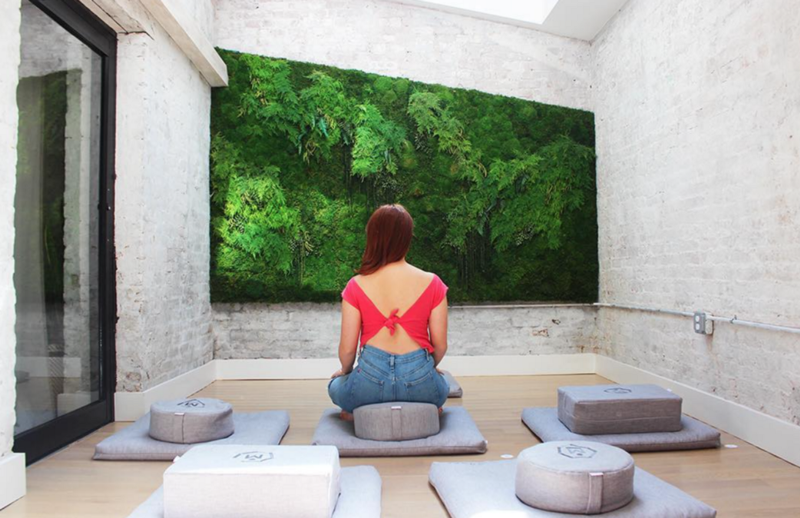
We’ve heard about the array of mental and physical benefits we can gain from a regular meditation practice. But where do we start, and what can we expect to learn from a meditation practice? We spoke to writer, performer, and meditation teacher, Kevin Townley to find out.
Splendid Spoon: Hi Kevin! Tell us about your meditation journey.
Kevin Townley: I was going through a bad breakup and turned to alcohol to numb the pain, which (spoiler alert!) didn’t work. It became so painful that I had a random flash of insight and Googled: “Heartbreak + Meditation”. A book called The Wisdom of a Broken Heart by Susan Piver came up. So I read it. The book suggests that rather than being something to medicate or pave over, heartbreak can actually be an express track into the Buddha’s teachings.
At that time, I was running a monthly variety show. I emailed Susan Piver to see if she lived locally, and would be willing to let me interview her. She responded, saying she lived in Boston, but would be happy to come down for the show.
We did the interview and afterwards she offered to be my meditation teacher (which she still is). As a result of her kindness I began studying and practicing in the Shambhala Buddhist tradition [a secular track of meditation that focuses on living with mindfulness and compassion — Ed.], and learned to give meditation instruction. I then met Lodro Rinzler, who invited me to teach at his New York meditation studios, MNDFL. And now, here we are!
Splendid Spoon: Can meditation silence our thoughts, or just quieten them?
Kevin: One of the most pernicious misconceptions about meditation is that it helps us to stop thinking. This isn’t true. The mind is designed to think, just as the eyes are designed to see. Trying to stop thinking is as annoying as trying to stop seeing with your eyes open.
However, over time, by peacefully abiding with whatever we notice arising in our minds, it does seem that our thoughts begin to slow or settle. We may notice more space in our minds, but we also might not!
Luckily, there’s no prescribed or preferred meditation experience. Whatever you experience in your practice, whether it be blissful serenity (whatever that means), or speedy, crazed thoughts, is your practice. If you follow the instructions to the best of your ability, you can’t practice incorrectly. You also can’t do it correctly!
Splendid Spoon: How can meditation change our mood?
Kevin: Meditation provides us with an environment where we can see that our moods (which are thoughts) are always changing. Rather than trying to cajole ourselves into being different or better (based on preconceived notions about who/how/what we should be), we just notice, with curiosity and gentleness, the mind shifting like a kaleidoscope.
Through meditation, we observe the whole colorful range of moods, without taking a stance on them. It may seem counter-intuitive to “not do anything.” However, this observant practice is essential: it’s our escape-routes and strategies that exacerbate our moods.
Splendid Spoon: How much do you have to meditate to feel the benefits?
Kevin: Everyone’s experience is different. However, meditation is always a path, not a life hack or a self-improvement technique (you’re already awesome!). You’re in it for the long haul. You may begin to notice benefits in a couple of weeks…but it may take longer. There are no guarantees.
Splendid Spoon: What are the key benefits you feel as a result of your meditation practice?
Kevin: A sense of relaxation; a willingness to lose the war against ourselves. Noticing that there’s space between our thoughts, impulses, and reactions. Feeling our emotions more fully without necessarily believing them. Experiencing more mental space, which enables us to be more patient and compassionate. Appreciating the world and feeling more tender-hearted. Trusting one’s own wisdom. And, most importantly, cultivating a sense of humor.
Splendid Spoon: Just as we detox our body through diet or exercise, can we rid ourselves of negative thoughts through meditation?
Kevin: I will say mostly, no! Meditation isn’t about getting rid of negativity. It isn’t about getting rid of anything. It’s about seeing that we’re addicted to believing our thoughts, when in fact they’re not real in the way we assume. We only notice a thought after it’s arisen. To have an opinion about whether we should have had the thought just adds unnecessary work.
By trying to get rid of negativity we go to war with our own minds. This is stressful and aggressive. Instead, try observing all thoughts (positive, negative, and neutral) as equals: they’re all just thoughts. One teacher said to me: “If you don’t do anything to thoughts they won’t do anything to you.” Remember, having a negative thought and acting on it are radically different. Meditation helps show us the space between the thought and the action.
I say “mostly no”, because it seems that the less our habits compel us into action, the weaker those habits become. So, you could say that meditation helps remove negativity, but not in the way we might assume. We can alleviate negativity by bringing awareness to the experience, not by playing whack-a-mole with our thoughts.
Splendid Spoon: What’s the best way to start incorporating a meditation practice into your day?
Kevin: Schedule it, and remember that consistency is more important that duration. It’s better to sit for 10 minutes every day than to sit for 90 minutes once a month. That said, don’t set yourself up for failure. Don’t say “I am going to sit every day for the rest of my life.” You won’t, and then you’ll feel bad and stop sitting.
Start with something that seems sustainable, like sitting for five minutes, five days a week, and build from there. Meditation is like any exercise…the doing can be tough, but that’s not a sign it’s failing. On the contrary. The benefits we feel from any exercise are enjoyed in our lives, not necessarily while we’re doing the exercise.
Splendid Spoon: Can meditation be used as a tool to create healthier habits?
Kevin: Meditation is a path of authenticity. We all have things we don’t like about ourselves and want to change — that may even be what gets us on the cushion. When we look at our minds, we see how little we know about ourselves. We learn that the negative opinions we have of ourselves are not our own: they’re cultural, and aren’t based on who we really are.
As much as we can, we should get over the idea that we’re going to fix ourselves. Instead, we should approach meditation practice as the act of befriending ourselves. We’ve all had the experience of being with a friend who’s going through a rough time. The best thing we can offer them is our authentic presence, and not a lot of advice. We can try to offer ourselves the same courtesy by just sitting and providing the space to be who we are as we meditate.
We may find that over time our habits do change (I attribute my sobriety to my meditation practice). However, whatever changes and benefits we experience seem to come from not doing anything at all; just looking at the mind without agreeing, disagreeing, or looking away. But don’t take my word for it! The path and practice of meditation is very personal. We all need to see for ourselves. Dive in! The wild, wonderful (and, more often than not, very boring) world of meditation is waiting for you.
